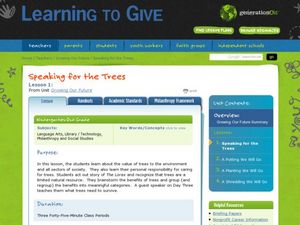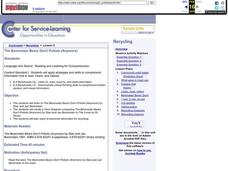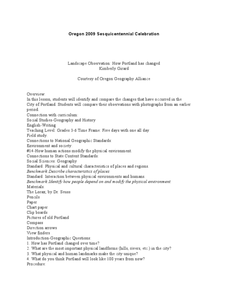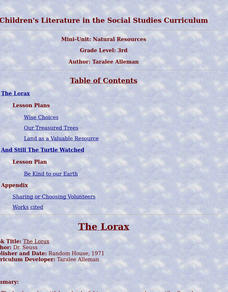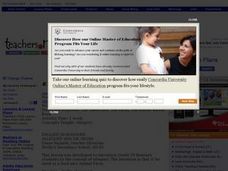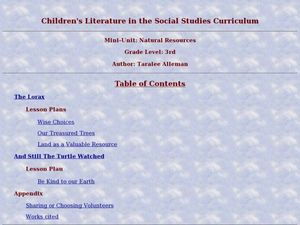Curated OER
The Lorax
Students listen to the story, The Lorax, and discuss the concept of being a spokesperson. They reflect on the concept of recycling and the importance of it in regards to our environment.
Curated OER
Speaking for the Trees
Learners present a play based on The Lorax.In this environmental issues lesson, students read and discuss literature and complete activities pertaining to environmental stewardship.
Curated OER
The Berenstain Bears Don't Pollute (Anymore)
Students listen to the story, The Berenstain Bears Don't Pollute (Anymore). They create a Venn Diagram comparing it with the story, The Lorax. Then students plan ways to become advocates for recycling.
Curated OER
Landscape Observation: How Portland Has Changed
Students read The Lorax and discuss how populations change the environment. Using given photos, students use a Venn Diagram to compare and contrast the Portland of yesterday to present day Portland. They write a comparison paper and...
Curated OER
Concern + Action = Clean Air Solutions
Learners participate in a service project about improving air quality. In this air quality instructional activity, students understand the problems and solutions for improvement of air quality issues. Learners discuss and choose an air...
Curated OER
Land as a Valuable Resource
Students investigate why the soil is important to our lives. In this natural resources lesson, students have a farmer as a guest speaker. Students begin to understand how farmers use and protect our natural resource. Students write...
Curated OER
Railroad Idioms Art Lesson Plan
Sixth graders research railroad idioms. In this idiom lesson plan, 6th graders read through a glossary of different railroad idioms and their meanings. They illustrate a chosen idiom.
Curated OER
Allegory and Dr Seuss
Tenth graders read Dr. Seuss books to discover what allegory is. They investigate how Dr. Seuss studenT books are allegories of events in the real world and create timeline
Curated OER
And Still The Turtle Watched
Third graders discuss ways to be kind to the Earth. For this conservation lesson, 3rd graders listen to the story And Still The Turtle Watched by Sheila MacGill-Callalhan. They compare how the early people treated the Earth to how we...
Curated OER
Making Connections, Linking Population and the Environment
Students find out that all habitats have a carrying capacity. They explore how the world's human population has grown markedly in the 20th century, and that humans impact environmental health. Students investigate that people can and...
Curated OER
Handling the Earth with Care
Eighth graders examine the characteristics of caring people. For this behavioral studies lesson, 8th graders differentiate between caring and uncaring personality traits. Students view a video about personality traits, and work in...
Curated OER
Dr. Seuss Characters
In this Dr. Seuss characters worksheet, students review and discuss sixteen main characters from his novels and circle each one in a word search puzzle.
Curated OER
Respecting Diversity
Students explore the concept of philanthropy. In this service learning lesson plan, students read and respond to The Sneetches by Dr. Seuss. Students discuss self-respect and respect.
Curated OER
Dr. Seuss Lesson Plan
Students read classic children's books. In this Dr. Seuss instructional activity, students read the Seuss classics The Cat in the Hat, Green Eggs & Ham and Horton Hears a Who. Students create models based on story characters and...
Curated OER
Positive and Negative Conflict
Students explore the concepts of positive and negative conflict. They examine the ideas of cooperation and competition and apply the idea of win-win to global climate change. Students participate in a friendly competition.



